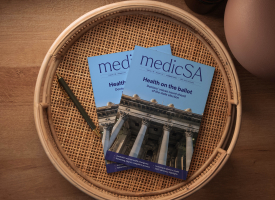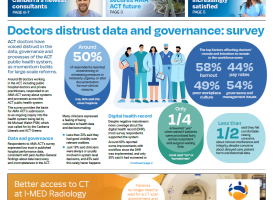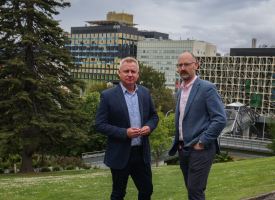Transcript - AMA President Dr Omar Khorshid on Australia's booster program - Afternoon Briefing
Transcript: AMA President, Dr Omar Khorshid, Afternoon Briefing, Wednesday, 15 December 2021
Subject: Australia’s booster program falling behind
HOST: PATRICIA KARVELAS: Staying with the latest COVID developments across the country, Omar Khorshid is the President of the Australian Medical Association and he joined me a little earlier.
…Welcome.
OMAR KHORSHID: Afternoon, Patricia.
PATRICIA KARVELAS: Does Australia have enough vaccines for the booster program?
OMAR KHORSHID: We've certainly heard nothing from government to suggest there's any concerns and remembering Australia has ordered many times more vaccinations than we have people in our country. So, we're pretty confident with the supply of vaccines.
What's really important for the booster program is making sure that we get them out fast enough. And with the emerging data around Omicron, with a surge in cases in New South Wales, it's becoming more and more clear that speed is of the essence, and for that to happen, we need all our GPs, all our pharmacists, and our state vaccination clinics to be completely committed and properly supported by government to do so in order to help us achieve this national priority.
PATRICIA KARVELAS: Okay. So, if we've got this supply and we're seeing these complaints from people who are trying to get the booster and say that they're having trouble getting it, what's going wrong?
OMAR KHORSHID: So, what's happened is the Government has reduced the fee payable to both GPs and pharmacists for their participation in this third dose, compared with what was paid for the first two doses. Plus, GPs are fatigued after a huge effort in vaccinating many millions of people in the first phase of the rollout, plus of course living with COVID, the disruptions, trying to provide normal medical care.
And looking forward, they're seeing their need to participate in the 5-to-11-year vaccination rollout too from January, and it's just very hard for them to maintain that pressure. End of the year is here, people want a break, and they're being asked to pull out all the stops and get behind again a mass vaccination-style program but being paid a lot less than they were before.
And it's really raised eyebrows in general practice, and I know with the pharmacists as well. And really, the AMA is calling on Government to really demonstrate its commitment to properly support our primary care sector, in helping us achieve a really high booster rate because I think these boosters are our only way to protect us from, not just Delta, but also Omicron.
PATRICIA KARVELAS: So, do you think vaccine passports should be a three-shot deal now, and we should actually commit to the fact that three shots is, at this stage, what the medical advice is?
OMAR KHORSHID: The medical advice has to follow science, Patricia, and unfortunately, the science isn't quite there yet to support a three-dose program as being at the core and to define someone as being fully vaccinated. We suspect it may well get to that. But before we start limiting people's freedoms, we've to get that science so that people can trust the decisions made by both ATAGI and government in this area. But as a betting man, I would be betting that will be the reality. We're seeing waning immunity both to Delta and of course with Omicron on the horizon for the entire globe. The importance of boosters is absolutely critical. And it means that we're going to have to incorporate them into every part of the program, not just say: hey, it's time for you to get a booster, off you go and get one.
PATRICIA KARVELAS: What's the priority, vaccinating 5 to 11-year-olds or rolling out the booster program?
OMAR KHORSHID: Well, both are actually important, but when we look at the reality of how COVID affects different parts of our population, it's actually our elderly and high-risk Australians who were vaccinated early in the program, who have been eligible for a booster for a little while now, but not all have taken it up.
Before the eligibility was increased earlier this week, only around 60 per cent of eligible people, 60 to 70 per cent, had actually been vaccinated and that means there's people out there whose immunity is waning and who are vulnerable and they are absolutely the priority, along with of course our healthcare workers and frontline workers.
But at the end of the day, we've got to get the whole lot done. We've got to get the kids vaccinated; we must protect them. We've got to get our whole population boosted. And that's what's going to be such a challenge as we move past the end of this year and into next year, and it's why we need our state governments to keep their vaccination clinics open.
We need to have a very clear message to the public that this is not an optional extra booster; this is a critical part of our response to COVID. And of course, we need our government to properly support the primary care sector through the amounts they're paid to do these extra things, to run extra clinics in the evenings, to keep their staff longer to work on weekends, because that's the only way we're going to get enough vaccines in arms, and we're talking another 30 odd million doses that have got to be rolled out through these programs. And that's up around a million doses a day- sorry, a week. We're nowhere near that at the moment.
PATRICIA KARVELAS: Dr Khorshid, New South Wales is up 804 cases from yesterday, but if we look at the ICU number and the number of deaths, we're talking about a really significantly lower figure because- than in the past because of vaccination. So, are you concerned about the case load? Because we're being urged to look at the other numbers.
OMAR KHORSHID: No. The case load itself, as the New South Wales Government have made clear, is not their focus. Their focus is on the numbers of people ending up in hospital, but the case load will have an effect eventually. And even if COVID cases are now much more mild, whether it be Delta or Omicron, in a vaccinated population, if you got tens of thousands of people contracting the disease, then you're still going to have significant numbers ending up in hospital, significant numbers in ICU, and that's something that we all want to avoid. So, if we can do that through boosters, if we can do that through reasonable social distancing measures, then that's what has to be done because a future of tens and tens of thousands of cases every day is one that is likely to see a hospital sector really struggling.
PATRICIA KARVELAS: Is the messaging in New South Wales around rule changes clear enough?
OMAR KHORSHID: Well, the rules are being relaxed at a time when we're seeing a bit of a surge in cases, so it is quite concerning to doctors, to the AMA. We hope the New South Wales Government have got it right, and they've- that the protection provided by the vaccines will allow this to spread through the community without people ending up in hospital. But it is a little bit of a gamble, with a brand-new variant clearly embedded now in New South Wales. We just don't know how fast it's going to spread and how many people are going to get sick.
PATRICIA KARVELAS: Thank you so much for your time.
OMAR KHORSHID: Cheers, Patricia.
PATRICIA KARVELAS: AMA president Omar Khorshid joining me a little earlier there.



